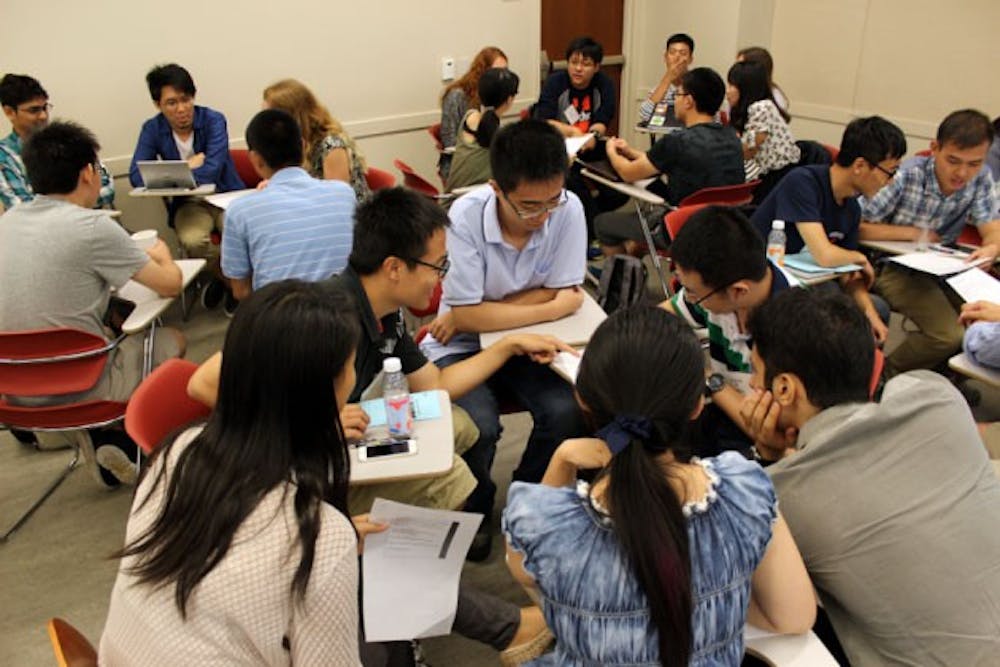While the stereotypes for a typical University student geographically center on Northern Virginia, in actuality, the faculty, workers and students at the University represent a wide range of countries and nationalities. Operating out of the Center for American English Language and Culture, or CAELC, Volunteering with International Students, Staff and Scholars — or VISAS — provides a support network for this international population.
Elizabeth Wittner, CAELC academic director and international teaching assistant program coordinator, said upon asking students in English as a second language, or ESL, classes how often they speak English, many students reported only engaging with an hour or two of English a day and focusing more on listening than speaking.
“[VISAS] is a way of being intentional about getting [teaching assistants] to use and practice English and interact with the culture,” Wittner said. “Teaching in the U.S. is very different than the kind of teaching that they were used to.”
VISAS began in 1999 under a different name as a class assisting international graduate students and teaching assistants, serving as both a course on language and cross-cultural understanding. Wittner said she decided to invite undergraduates to the class and was surprised by how well things went.
“[The students] got along so well — they started talking after class and it just kept going and going,” Wittner said. “I knew that the English language learners would really want to meet undergraduates and get out of their bubble in the labs, but what really floored me was the amount of enthusiasm from the [undergraduate] students.”
The program officially incorporated undergraduates and eventually evolved into VISAS, adding new facets such as weekly conversations with hospital workers, mock lectures and assistance in ESL classes. After a VISAS volunteer noticed a number of workers in Observatory Hill Dining Hall from Somalia and suggested expanding the program in 2007, O-Hill dining employees now meet with students weekly or bi-weekly to converse as part of the Workplace Program.
“We have wonderful support from the managers at [O-Hill, Newcomb Dining Hall, and the University Hospital] to help us facilitate ways to meet with potential learners and see what the interest level is, see what their needs and goals are as well as what the management’s goals are for their employees,” VISAS Instructional Coordinator Trecia Gunnoe said.
Student interns at these three locations — all part of the Workplace Program — provide volunteers with materials to help learners achieve their goals, such as passing the citizenship or driver’s education test.
“Some of these learners at O-Hill have been working with VISAS for years,” Gunnoe said.
Student and learner pairs are set for at least one semester but can continue to work together longer if desired. Wittner recalled one learner who named her child Lily after a volunteer.
“I can confidently say that every one of our student volunteers is taking just as much, if not more, from their time at O-Hill as the employees,” Kaelyn Quinn, fourth-year College student and O-Hill Workplace Program co-director, said.
Students find working with learners to be an eye-opening experience, Quinn said, citing a time one of the pairs was reading a passage about an explorer who walked for two weeks. When the volunteer noted the length of the walk, the learner shared the experience of walking 500 miles to the border when leaving their country.
VISAS also provides conversation partners for spouses of international scholars or students.
“Spouses … find that they’re a little bit isolated because they’re not a student, they can’t work here and they don’t speak the language, so it’s really hard for them to become integrated into the community,” Wittner said.
With over 400 involved, VISAS aims to reflect the student diversity at the University in its volunteer population. While only native English speakers can be conversation partners, any student may be a Classroom Consultant, giving feedback to prospective TAs on mini lessons.
“This is really a multicultural, diverse, multigenerational, lovely program, because it really brings everybody in and makes everyone feel part of the U.Va. community,” Gunnoe said.







